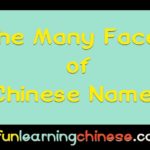(未知)(或者是)(不知道) (ㄨㄟˋ ㄓ)(ㄏㄨㄛˋ ㄓㄜˇ ㄕˋ)(ㄅㄨˋ ㄓ ㄉㄠˋ) (wèi zhī)(huò zhě shì)(bù zhī dào) (未知)(versus)(不知道) 我們不知道的未知,我們很想知道! (我們)(不)(知道)(的)(未知),(我們)(很)(想)(知道) (ㄨㄛˇ ㄇㄣ˙)(ㄅㄨˋ)(ㄓ Continue Reading
Chinese Lesson Blurb: Using 卻 to Spotlight Contradiction
Politicians are masters of contradiction Politicians have a way of making rules for everyone else and exempting themselves. So it is no wonder that the common use of 卻 ㄑㄩㄝˋ (què) to indicate Continue Reading
Available 有空,沒事,有錢,可以用,有賣,空缺 in Chinese
Sometimes English words seem vague to native Chinese speakers. Most of you have learned that there is no direct translation for “yes” and “no” in Chinese. Answers to questions are given Continue Reading
Figure It Out 算出來,想出來 … in Chinese
The English phrase figure it out means to solve, to understand, to reason out This is consistent with the definitions of the word figure, which have to do with both to form or shape and Continue Reading
The Many Faces of Chinese Names
Why do Chinese people choose English names? Every Chinese person I have met has had an English name. Whether they were living in Taiwan, living in the United States, or on a cruise ship, each one Continue Reading
Are You Finished 你完成了嗎 in Chinese
The other day I accidentally told my Chinese tutor that I was perfect. 我說「我完全了!」 (我)(說)「(我)(完全)(了)!」 (ㄨㄛˇ) (ㄕㄨㄛ) [(ㄨㄛˇ) (ㄨㄢˊ ㄑㄨㄢˊ) (ㄌㄜ˙)] (wǒ)(shuō) [(wǒ)(wán quán)(le.)!] (I)(to say, Continue Reading





